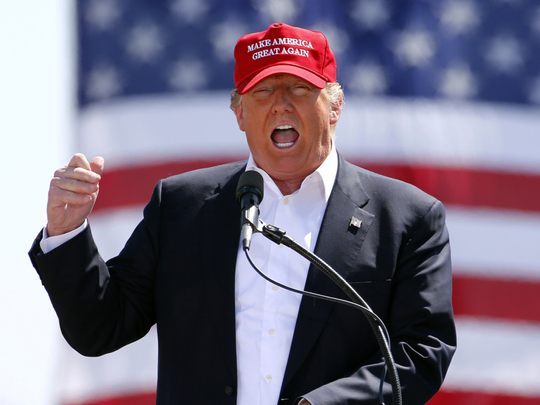
Let’s start here: Hillary Clinton is a deeply flawed American presidential candidate. Roughly six in 10 Americans don’t think she is honest and trustworthy. She struggles to connect on the campaign trail. She is, by her own acknowledgement, not a “natural” candidate. She is deeply polarising.
For all of those reasons, Republicans in the United States at the start of this election cycle could barely contain their glee at the chance to run against Hillary. Elections are fundamentally about the future, and Hillary was a figure from the past, they argued. And not only that! Hillary was also one of the most known and judged people in American culture. Run a campaign entirely focused on reminding voters what they didn’t or don’t like about the Clintons. Win. It was as simple as that, many Republicans believed.
Enter Donald Trump. If the Hillary forces could have handpicked a Republican candidate to run against this autumn, it would almost certainly have been Trump. He’s even more high-profile than she is. He’s even more controversial than she is. He’s even more prone to dominate media coverage than she is.
None of those things are good for Republicans. If the recipe to winning the White House in November is to turn the race into a referendum on Hillary, Trump is the exact worse choice to do that. Take the race to date as evidence. Trump has, without question, overshadowed Hillary (and every other candidate) for the nine months he has been an official candidate. Yes, when Hillary’s email problems bubble up, they get covered. And, yes, when Bernie Sanders beat Hillary in Michigan or she swept all five states on March 15, that got covered, too. But, generally, the story each and every day is Trump Trump Trump Trump.
Loving the spotlight
Trump promises that if he is the nominee, he will act differently than he has in the course of winning the nomination — more “presidential”. But the defining quality of Trump’s time in public life, which spans decades, is a knack for attracting — and a love of — the spotlight. He is someone who lives his entire life in public — and likes it that way. He takes pride in his ability to get attention. He regularly touts how he hasn’t had to spend as much of his own money as he thought he might have to in this campaign because he’s got so much free media attention.
All of that has been great for him in a primary context. He has sucked the oxygen out of the GOP field, strangling the likes of Jeb Bush, Scott Walker, Marco Rubio and Chris Christie in the process. But a primary against 16 other candidates is not the same thing as a one-on-one general-election race against Hillary Clinton. Trump’s ability to draw attention to himself — largely via a willingness to say and do things other politicians won’t — works far less well in the latter race than it does in the former.
The less the general election focuses on Hillary, the better for her and Democrats. It’s as simple as that. There are very few people in the political arena who could possibly knock Clinton down to second billing. Trump is one of them. And not in a good way, if you are a Republican with an eye on reclaiming the White House.
— Washington Post
Chris Cillizza writes The Fix, a politics blog for the Washington Post. He also covers the White House.








